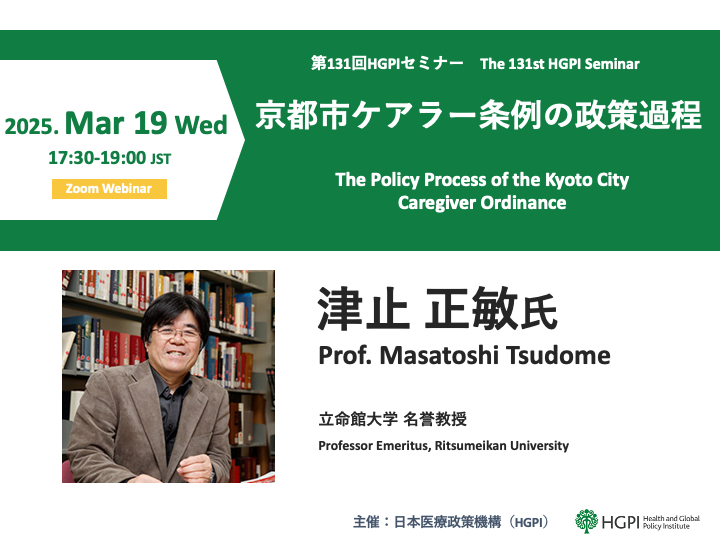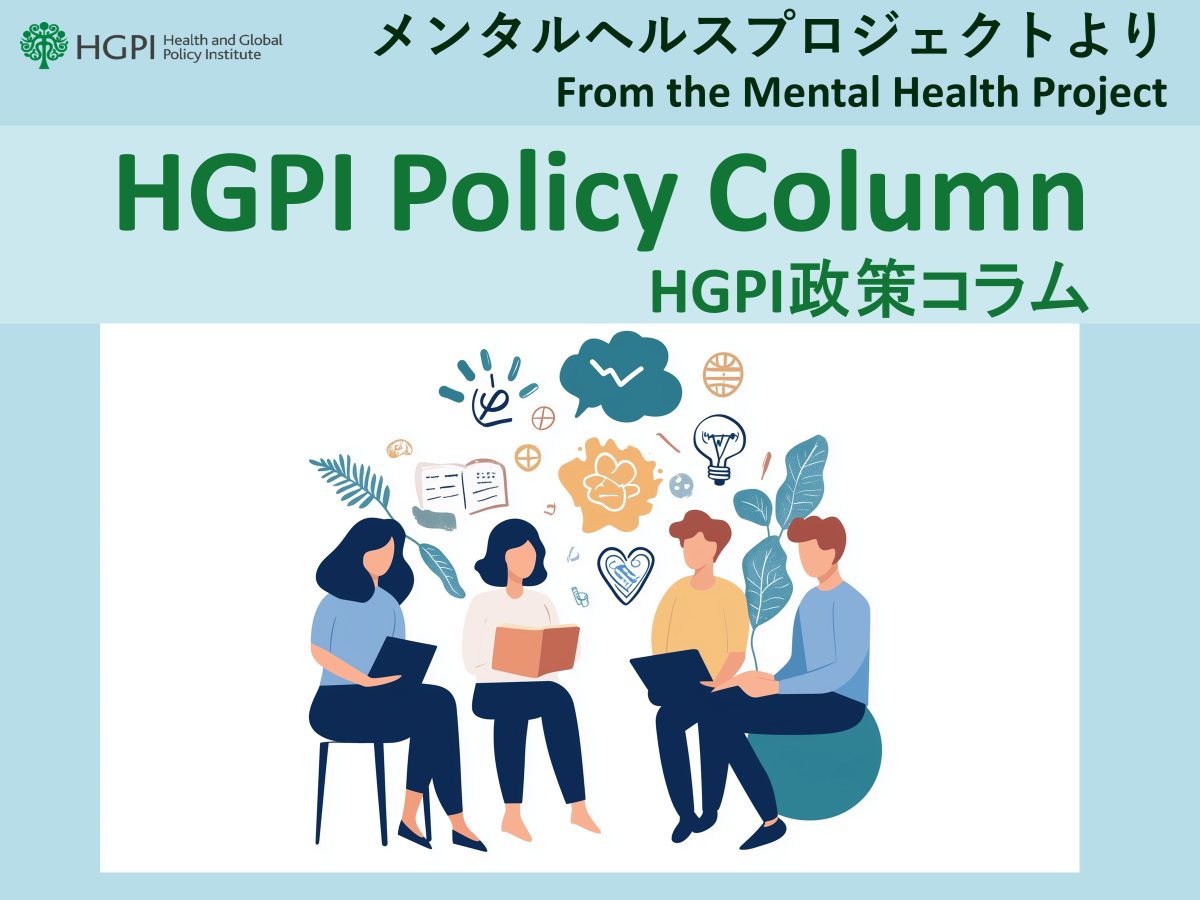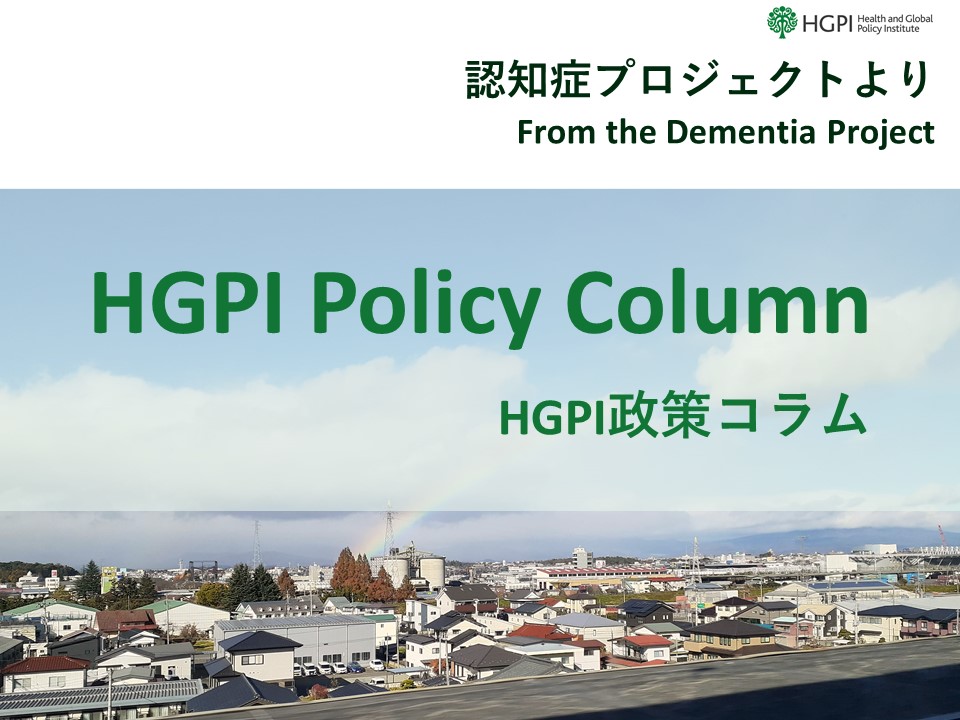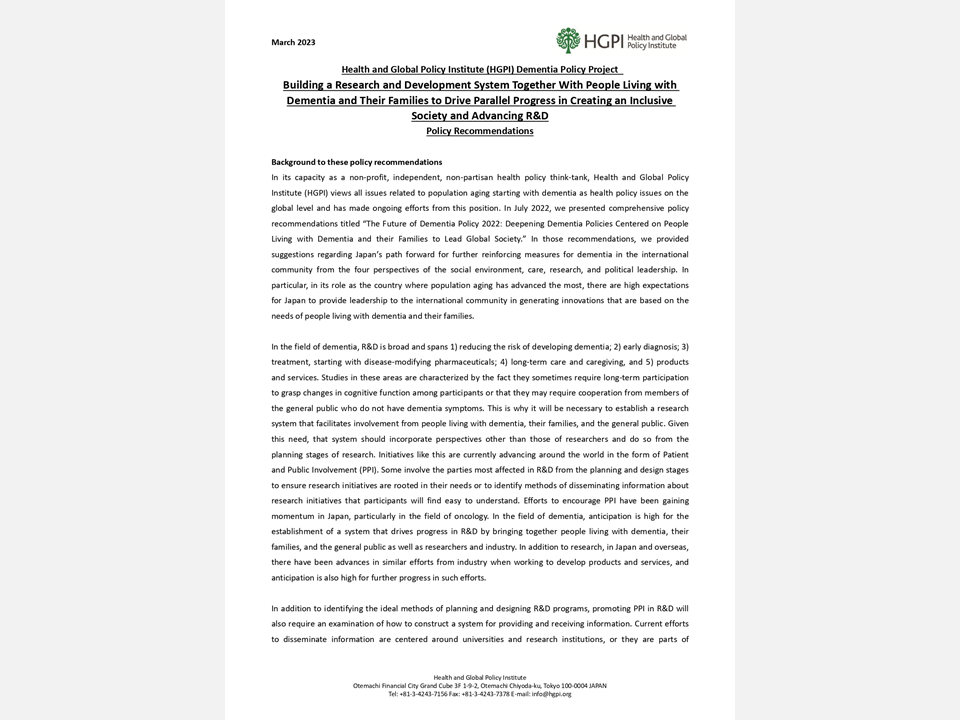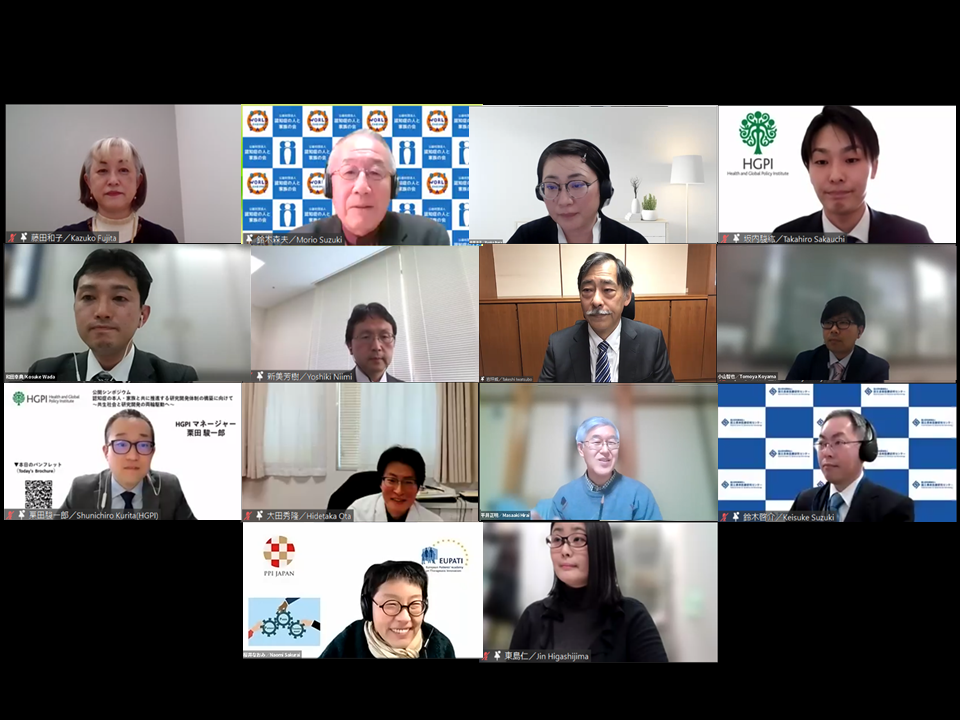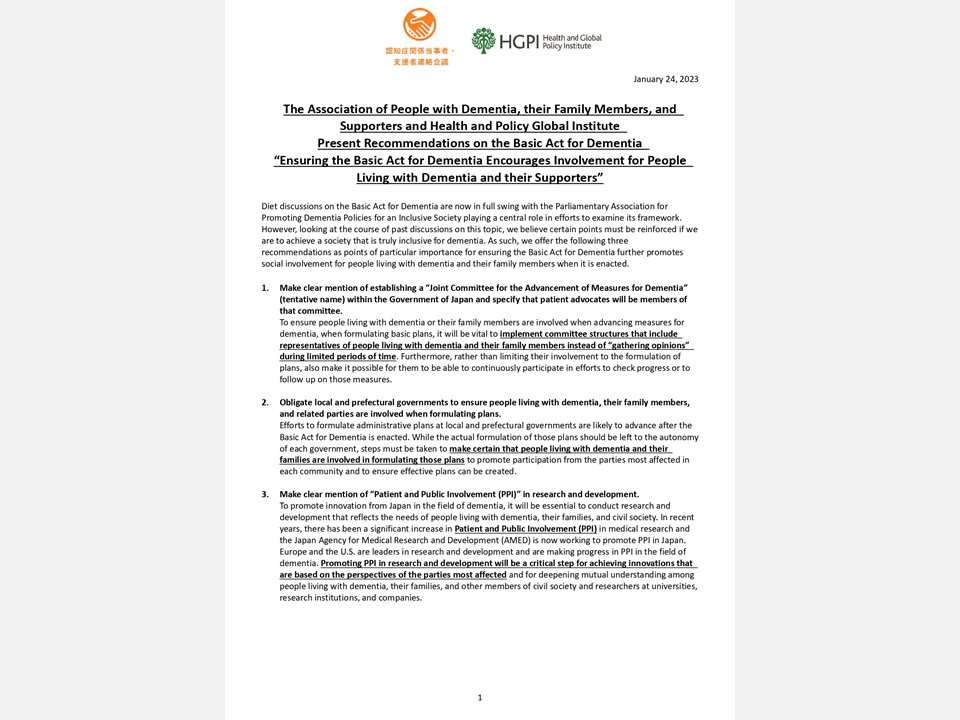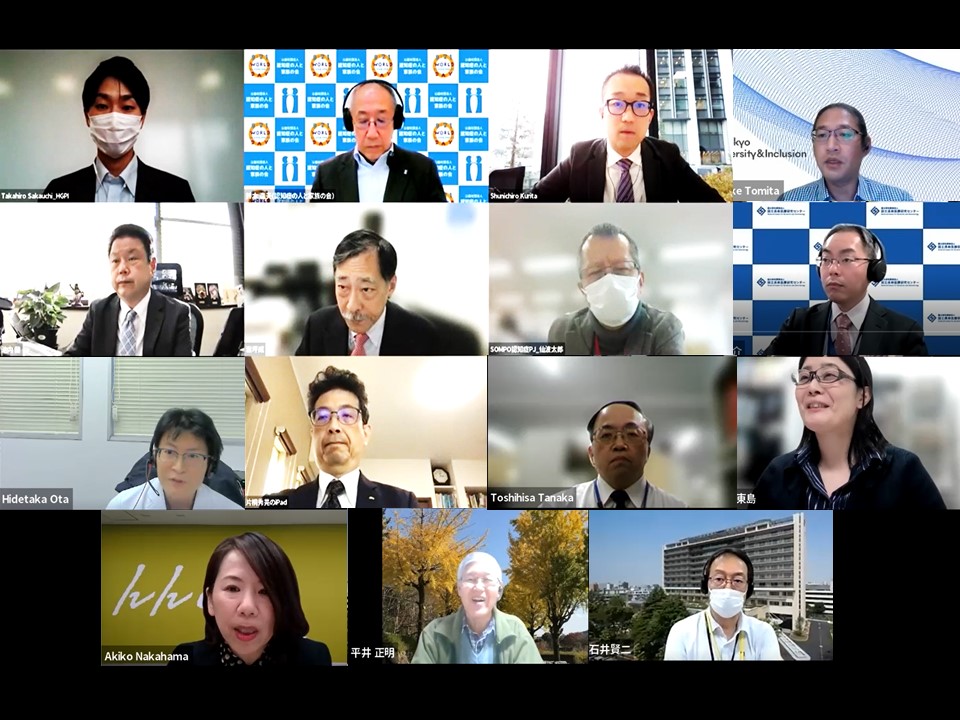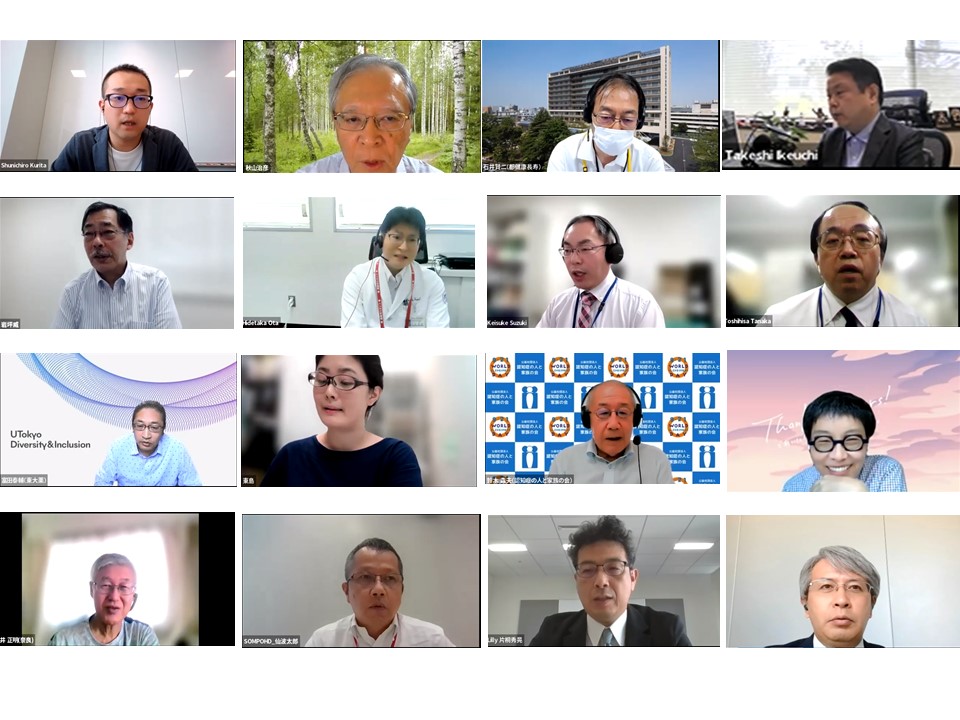[HGPI Policy Column] (No.53) From the Dementia Project “The Future of Dementia Research Co-created with Affected Parties, Vol. 1: Three Key Points for Achieving Meaningful Involvement”
date : 3/5/2025
Tags: Dementia, HGPI Policy Column
![[HGPI Policy Column] (No.53) From the Dementia Project “The Future of Dementia Research Co-created with Affected Parties, Vol. 1: Three Key Points for Achieving Meaningful Involvement”](https://hgpi.org/en/wp-content/uploads/sites/2/HGPI_202503_Three-Key-Points-for-Achieving-Meaningful-Involvement.jpg)
<POINTS>
-
The Basic Act on Dementia to Promote an Inclusive Society (hereinafter, the “Basic Act on Dementia”) mentions the importance of involvement among people living with dementia and other affected parties, making it a major step forward from past dementia policies.
-
There are high expectations for advances in Patient and Public Involvement (PPI) in a vast range of research areas. People living with dementia and researchers working together to consider and engage in co-creation from the outset must be the basis of all research.
-
Taking global developments into account, five phrases can be considered key elements for PPI in dementia research: “Shared leadership,” “Nothing about us without us,” “Active participation,” “Partnership,” and “Co-creation.”
-
There are three key actions for building a foundation for PPI in dementia research: (1) building relationships of trust among affected parties and researchers that make them partners in research; (2) deepening mutual understanding between researchers and affected parties; and (3) co-creating the ideal forms of involvement through stakeholder dialogue.
Past developments in discussions on PPI in dementia research
In the field of dementia, there are high expectations for innovative developments that reflect the needs of people living with dementia, their families, and their caregivers, and there is a need to foster a research environment that facilitates the involvement of these parties. Many opinions from people living with dementia were reflected during the formulation process of the Basic Act on Dementia to Promote an Inclusive Society (or, the “Basic Act on Dementia”) enacted in 2023, which makes clear mention of the importance of involvement for people living with dementia and other affected parties. In this regard, it differs greatly from past measures. As its title suggests, the objective of the Basic Act on Dementia is to create an inclusive society. Article 1 describes the significance of an inclusive society and aims to surpass healthcare and welfare policies to provide a framework for all of society to be inclusive for people living with dementia. In addition, Article 3 guarantees people living with dementia opportunities to “independently participate in activities in all areas of society,” while Article 20 mentions involvement in research and development. The concept of involving people living with dementia in research on dementia described by the Basic Act is centered on their right to self-determination in daily life and care, their fundamental human rights, and the Rights Based Approach (RBA) that serves as the basis for those rights.
The Basic Act on Dementia defines “dementia research” as “research and other activities that contribute to a more inclusive society,” so it has an extremely broad perspective on research. In general terms, such research can be sorted into three categories: (1) medical research that focuses on dementia and its underlying causes to understand dementia and dementia symptoms or develop treatments; (2) research on long-term care, rehabilitation, and other forms of care and in the fields of natural or social sciences; and (3) research that is centered on industry and includes areas such as the development of products and services. It is safe to say that the first steps in promoting PPI will be to clarify the significance of having researchers and people living with dementia, their families, and their caregivers jointly conceive of and create research from its outset for all these forms of research, and to then discuss methods of implementing PPI.
In the Basic Plan for the Promotion of Policies on Dementia, which was approved by Cabinet Decision in December 2024, Priority Goal 4 is, “Citizens can make effective use of new knowledge and technologies related to dementia,” and it includes involvement for people living with dementia as a key element. While there have been numerous examples of involvement in the field of dementia in processes for community development and policy formulation in many regions throughout the country, there has yet to be similar progress in research and development, especially research in which people living with dementia and researchers share leadership and act as partners. In the future, further efforts will be necessary to expand PPI in research.
Past efforts from HGPI for PPI in dementia research
In FY2022, HGPI gathered people living with dementia and their families as well as representatives of industry, Government, academia, and civil society to discuss the nature of involvement for people living with dementia in dementia research for a broad range of themes. The group met multiple times over the fiscal year for discussions that covered the importance of collaboration in many areas, disseminating and implementing the results of research, and the need to construct a foundation for collaboration in such efforts.
- The First HGPI Dementia Policy Project Roundtable Discussion on “Establishing a Multi-Stakeholder Public-Private Partnership in the Field of Dementia – Driving Parallel Progress on an Inclusive Society and in R&D” (August 31, 2022)
- The Second HGPI Dementia Policy Project Roundtable Discussion on “Building an R&D System Together with People Living With Dementia and Their Families – Driving Parallel Progress on an Inclusive Society and in R&D” (November 15, 2022)
- Dementia Policy Project Symposium “Building an R&D System Together with People Living With Dementia and Their Families – Driving Parallel Progress on an Inclusive Society and in R&D” (February 2, 2023)
Based on those discussions, we compiled the following policy recommendations.
■ Overview of Policy Recommendations ”Building a Research and Development System Together With People Living with Dementia and Their Families to Drive Parallel Progress in Creating an Inclusive Society and Advancing R&D”
Recommendations:
To achieve innovations in dementia that are based on the needs of people living with dementia, their families, and citizens, a collaborative platform centered on civil society should be established.
Anticipated features for the collaborative platform:
- Features that promote Patient and Public Involvement (PPI) and PPI-centered development
- Features that provide suitable support and easy access to information regarding research programs to all participants
- “Participant first” and “Family first” features that provide access to care through research program participation
- Features that enable two-way feedback among participants and researchers after research programs are concluded and that create communities that last
- Features that allow opinions on and evaluations of innovations that have been introduced to be accumulated and utilized to contribute to further improvements
Given the lack of collaboration among related parties with regards to involvement for people living with dementia, in our recommendations, we clearly stated the need to build a platform led by civil society and especially people living with dementia to achieve innovations that are based on the needs of people living with dementia, their families, and citizens.
Over the course of discussions on the Basic Act on Dementia, based on these recommendations, we continuously advocated the importance of meaningful involvement, such as by proposing that the law include the concept of PPI in research. Moving forward, HGPI would like to continue advancing discussions by serving as a hub and by collaborating with industry, Government, academia, and civil society.
Key words for PPI in dementia research
Next, based on findings from an ongoing global study on PPI in dementia research, we will share key words in PPI and key points for building a foundation for PPI in dementia research in Japan.
The concept of involving patients and citizens in research originated in English-speaking countries, with the terms “Patient and Public Involvement” and “PPI” coming from the U.K. Over the course of our desk studies and interviews, it has become clear that there is variation in how these concepts are recognized or defined among countries. At the same time, the terms listed below have emerged as common key words in each country.
Key words in PPI
- Shared leadership: Refers to when researchers and affected parties are equally involved in research, and the perspective that it is important for these parties to collaborate with a sense of ownership.
- Nothing about us without us: This is the slogan from the Convention on the Rights of Persons with Disabilities (CRPD) and it emphasizes that the right to self-determination and the human rights of people living with health concerns should be upheld.
- Active participation: The perspective that it is necessary for all stakeholders to be proactive and engaged.
- Partnership: This encompasses the perspective that it is necessary for affected parties to be able to collaborate in a substantive manner in all processes, without their involvement being a mere formality.
- Co-creation: When researchers and affected parties work together to shape and define involvement for those most affected.
Three key points for building a foundation for PPI in future domestic research
To conclude, we would like to share three points to keep in mind and use as a foundation when promoting PPI in dementia research in Japan.
1. Among people living with dementia and researchers, build relationships of trust that make them partners in research
It will be important to remove the labels of “affected party” and “researcher” and build trust among these parties on a person-to-person level. Making it so all parties can rest assured that others will listen to their voice is the first step in meaningful involvement. We must recognize trust as the foundation for all forms of involvement, and work to build trust, even if it takes time.
2. Deepen mutual understanding among researchers and affected parties
It will be important to reaffirm that research is not conducted for the benefit of researchers, but for those impacted by it after its completion – namely, people living with health concerns and the general public. It is also necessary for researchers to understand that there is a significant gap in knowledge and perception among them and affected parties, and researchers must take responsibility and make conscious efforts to bridge that gap. Even breaking down medical terms in a way that they can be understood by members of the general public can be very helpful. People with lived experience are vital for medical research, and researchers must do everything in their power to support them and help deepen their understanding of research. Affected parties should also learn about researchers’ opinions and research content and strive to deepen their understanding, so efforts must also be taken to support this, such as by providing opportunities for those parties to learn from each other.
3. Ensure PPI in dementia research is ideal for affected parties by co-creating PPI through dialogue among stakeholders
As mentioned above, a global study on PPI found that underlying cultural factors and issues in each country have led to variation in how PPI is defined and how much progress has been made in involvement. Rather than implementing examples from each country in Japan as-is, it will be important to take time and hold careful conversations among stakeholders like affected parties and researchers and search for the best structure for PPI that is tailored to Japan.
Leveraging our position as an independent and private think-tank, HGPI will continue contributing to the promotion of involvement for people living with dementia in dementia research, particularly by providing opportunities for discussion.
*This column is based on a lecture titled “Patient and Public Involvement (PPI) in Dementia Research,” which was given at Symposium 6 of the 43rd Annual Meeting of the Japan Society of Dementia Research.
Author
Nana Moriguchi (Associate, HGPI)
Shunichiro Kurita (Senior Manager, HGPI)
Top Research & Recommendations Posts
- [Policy Recommendations] The Path to a Sustainable Healthcare System: Three Key Objectives for Public Deliberation (January 22, 2026)
- [Research Report] The 2025 Public Opinion Survey on Healthcare in Japan (March 17, 2025)
- [Research Report] Perceptions, Knowledge, Actions and Perspectives of Healthcare Organizations in Japan in Relation to Climate Change and Health: A Cross-Sectional Study (November 13, 2025)
- [Policy Recommendations] Reshaping Japan’s Immunization Policy for Life Course Coverage and Vaccine Equity: Challenges and Prospects for an Era of Prevention and Health Promotion (April 25, 2025)
- [Research Report] The 2023 Public Opinion Survey on Satisfaction in Healthcare in Japan and Healthcare Applications of Generative AI (January 11, 2024)
- [Research Report] AMR Policy Update #4: Cancer Care and AMR (Part 1)
- [Public Comment Submission] “Assessment Report on Climate Change Impacts in Japan (Draft Overview)” (December 24, 2025)
- [Policy Recommendations] Developing a National Health and Climate Strategy for Japan (June 26, 2024)
- [Research Report] The Public Opinion Survey on Child-Rearing in Modern Japan (Final Report) (March 4, 2022)
- [Research Report] Survey of Japanese Physicians Regarding Climate Change and Health (December 3, 2023)
Featured Posts
-
2026-01-09
[Registration Open] (Hybrid Format) Dementia Project FY2025 Initiative Concluding Symposium “The Future of Dementia Policy Surrounding Families and Others Who Care for People with Dementia” (March 9, 2026)
![[Registration Open] (Hybrid Format) Dementia Project FY2025 Initiative Concluding Symposium “The Future of Dementia Policy Surrounding Families and Others Who Care for People with Dementia” (March 9, 2026)](https://hgpi.org/en/wp-content/uploads/sites/2/dementia-20260309-top.png)
-
2026-02-05
[Registration Open] (Webinar) The 141st HGPI Seminar “Current Status and Future Prospects of Korea’s Obesity Policy: Voices of People with Lived Experience in Policy Promotion” (March 3, 2026)
![[Registration Open] (Webinar) The 141st HGPI Seminar “Current Status and Future Prospects of Korea’s Obesity Policy: Voices of People with Lived Experience in Policy Promotion” (March 3, 2026)](https://hgpi.org/en/wp-content/uploads/sites/2/hs141-top-1.png)
-
2026-02-06
[Research Report] AMR Policy Update #5: Cancer Care and AMR (Part 2)
![[Research Report] AMR Policy Update #5: Cancer Care and AMR (Part 2)](https://hgpi.org/en/wp-content/uploads/sites/2/HGPI_20260204_AMR-Policy-Update-5.png)




